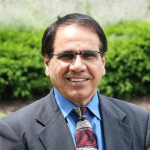
Two biotech executives face decades in prison after a federal grand jury in Maryland indicted them on multiple charges related to a scheme to defraud investors about the potential of the experimental monoclonal antibody drug leronlimab also known as PRO 140.
Former CytoDyn CEO Nader Pourhassan has drawn attention over the past two years for loudly touting leronlimab as an effective treatment for HIV, cancer and Covid-19, despite clinical data indicating opposite.
A federal grand jury indicted Pourhassan, along with the president of the company that ran the biotech’s clinical trials, with lying to the public and investors about the data behind his drug trials and the status of his drug license application. biologics (BLA) in a scheme to increase its share price.
Pourhassan and Kazem Kazempour, co-founder, president and CEO of Amarex Clinical Research, have both been charged with one count of conspiracy to commit securities and wire fraud, three counts of fraud in securities and two counts of wire fraud related to an HIV BLA Plan.
Pourhassan and Kazempur were charged with additional charges for other alleged conspiracies.
Pourhassan was charged with another count of securities fraud and an additional count of wire fraud related to a COVID-19 scheme also involving the drug leronlimab, and three counts of insider trading.
 Kazem Kazempur
Kazem KazempurKazempur was additionally charged with one count of making false statements to federal law enforcement officers.
Kazempur’s company, Amarex, managed CytoDyn’s clinical trials and was the regulator in interactions with the FDA. Kazempur also served on CytoDyn’s Disclosure Committee.
The two biotech leaders could see decades behind bars if found guilty. Pourhassan and Kazempur face a maximum sentence of 20 years in prison for each count of securities fraud and wire fraud, and five years in prison for conspiracy. Kazempour also faces a maximum sentence of five years in prison for making false statements.
It all started in 2020 when CytoDyn told shareholders it had submitted a full BLA for leronlimab as a combination therapy with antiretroviral therapy for HIV patients taking multiple medications.
But according to documents filed in federal court, Pourhassan told Kazempour to submit the BLA to the FDA even though it was incomplete, although both men knew the FDA would reject it. CytoDyn then allegedly lied to investors that a full BLA had been submitted and sold millions of dollars of company stock based on that lie.
CytoDyn received a denial letter in July 2020.
In January 2020, the company began touting leronlimab as a treatment for COVID-19, going so far as to claim the antibody had “saved” patients dying from Covid-19. The claims caused stock prices to soar, and Pourhassan sold millions of dollars worth of stock.
These near-daily allegations via press releases and on YouTube have caught the attention of federal investigators. In 2021, CytoDyn announced that the Department of Justice and the Securities and Exchange Commission had subpoenaed the company and some of its executives in an investigation into the company’s promotional and marketing practices.
Despite the investigation, the company continued to make statements about the drug’s impact on Covid-19, even though the data had shown it to be ineffective.
Earlier this year, CytoDyn dumped Pourhassan as CEO in a bid to rehabilitate its image after disastrous attempts to market leronlimab as a catch-all treatment for HIV, Covid-19 and cancer.
Shortly after Pourhassan’s expulsion, the FDA issued a rare public warning to the company when a promotional video resembling a news story featuring Pourhassan “significantly” misinterpreted clinical data on the efficacy of leronlimab. against Covid-19.
Three separate agencies are investigating, including the FBI Field Office in Baltimore, FDA-OCI and USPIS.
Editor’s Note: An earlier version of this story incorrectly stated that a grand jury found Pourhassan and Kazempour guilty, when the grand jury indicted them. The story has been corrected; the title has been updated. Endpoints News regrets the error.


Comments
Post a Comment